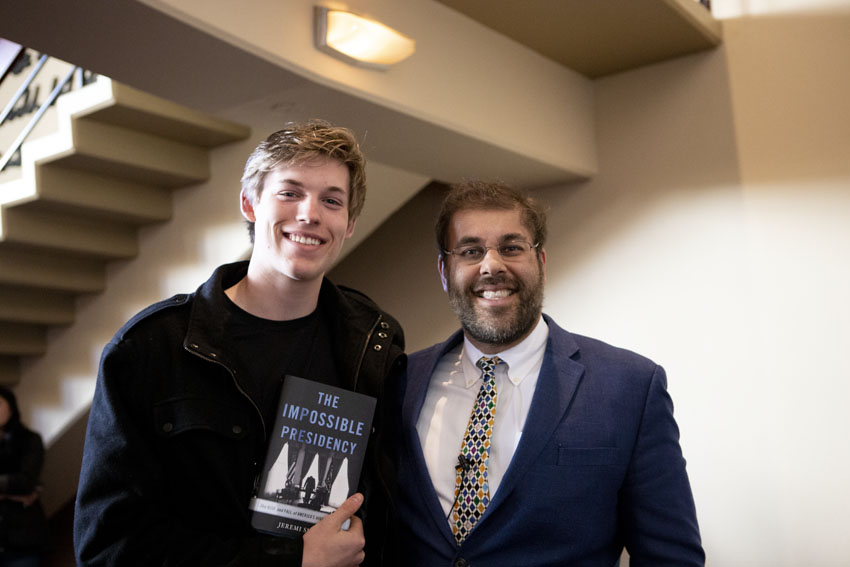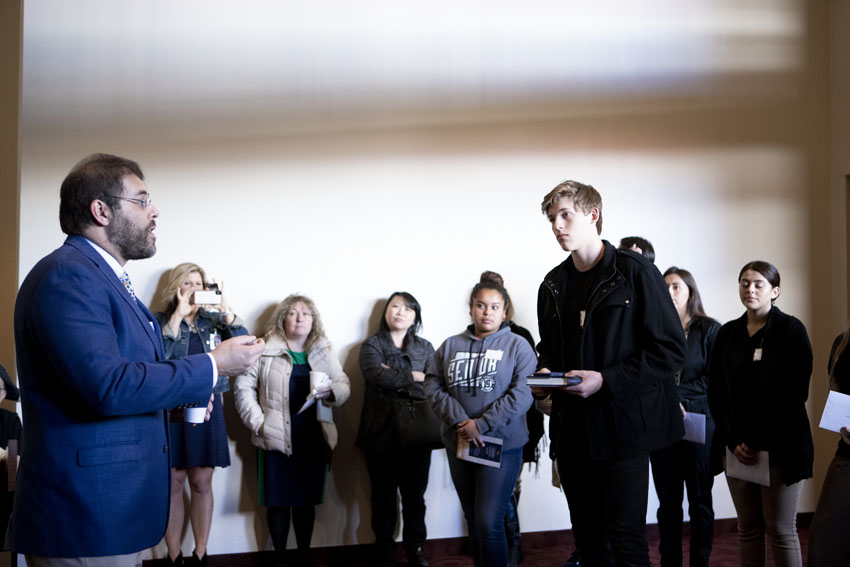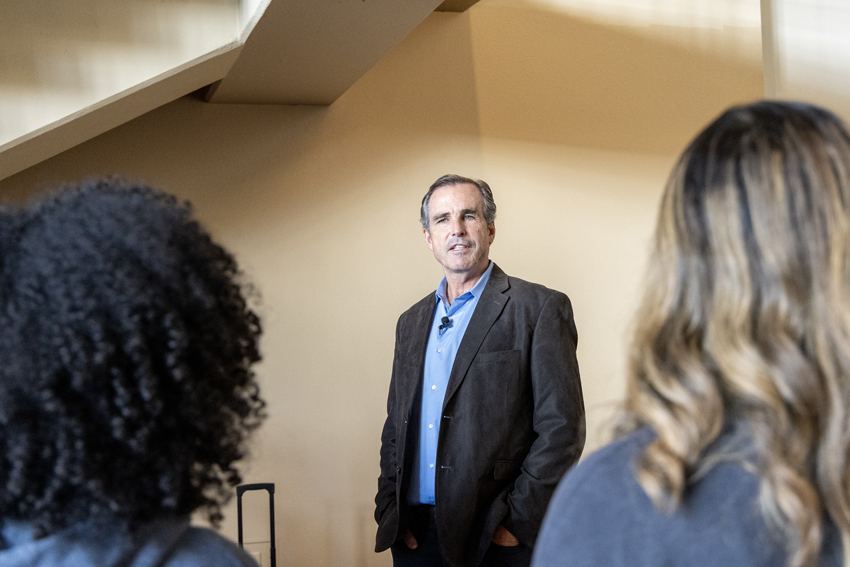History professor educates and inspires Fresno audience
Dr. Jeremi Suri, Professor of Contemporary Politics and Foreign Policy, spoke during the latest San Joaquin Town Hall at the Saroyan Theatre, March 11. Suri discussed the evolution of the American presidency from its founders to some of the evolutionists of the office.
Jeremi Suri holds the Mack Brown Distinguished Chair for Leadership in Global Affairs at the University of Texas at Austin. He has authored edited nine books on contemporary politics and foreign policy.
Suri’s research and teaching have received numerous honors.
In 2007 Smithsonian Magazine named him one of America’s “Top Young Innovators” in the Arts and Sciences. His writings appear widely in blogs and print media. Professor Suri is also a frequent public lecturer and guest on radio and television programs.

Suri began his Fresno Town Hall lecture with the question: Why do we study history?
According to Suri, people study history for two reasons:
- If humanity chose not to study history, they become “orphans” as they forget their identity and origin.
- Without the knowledge of the past, Suri sees history repeating past mistakes. Knowledge of the past helps create better decisions for future generations.
Suri discussed the importance of appreciating history and learning from it. He spoke about taking action and applying the past situations to the present challenges.
“A big problem, when we talk about democracy, is we must understand the history of democracy to appreciate what democracy is today,” Suri said. “That’s the first reason we study. The second reason is that you cannot imagine or create a new future if you don’t know the past. It is because by studying the past, you can imagine new features. What that is citizens are unfortunately living with today is the tyranny of the president. They see the world around them. They don’t like it.”
Suri continued to reveal how the U.S. presidency evolved. Suri speaks about the presidential empathy in his article, How presidential empathy can improve politics.
He asked two questions concerning the American presidency: “What brought us here, and how do we learn for a new future?”
George Washington developed the concept of the president’s office, a topic not discussed in the Constitution. Article Two of the Constitution explains more of how the president should be elected but not how they should delegate. Presidents are left with past examples as their only way of guidance.
The founders agreed that we needed someone who would bring the country together. Suri gave insight into 18th century America, revealing the country was more divided then than today’s America. States often disagreed on policies, causing dissent within the government. The idea was that the president would bring the people together and protect them.
Washington created a model for the presidential office where they belonged to no party; a union kept together by the people.
At a turning point in the history of the office, Suri shares how President Abraham Lincoln changed the office. Lincoln was a poor white lawyer from Kentucky, morally and economically opposed to slavery and believed the US needed more than a father figure. Most believe Lincoln was a great capitalist president.
Lincoln created a public university system. He gave land to the states and the states sold it to provide for universities. The US became an economic power during 1870-1970. During this time, public university system students go on to influence and build an economy that would rule the world. This is when the best talent would come out of America. Lincoln left a legacy of a union provider and a national provider.
Below is a podcast featuring journalist Carston Saelzler, ’21, speaking with Dr. Jeremi Suri during SJV Town Hall, March 11.
According to Suri, Theodore Roosevelt would internationalize Lincoln’s ideas and Franklin D. Roosevelt was his favorite president. He shared why he respects him and what he did to strengthen the growth of the U.S.
“Franklin D. Roosevelt knew his history and where the office come from,” Suri said. “He recognizes despite his privilege that although capitalism is the most effective, it leaves people behind. There are winners and losers. Then the Great Depression comes. He had to invent a new role for the president. A healer. Someone who connects continues and provides hope. He used the presidency to bring people together to solve their problems together. For example his fireside chats.”
The Great Depression in America lasted from 1929-39. During the Great Depression, the stock market lost almost 90% of its value. Around 11,000 banks failed, leaving many with no savings. In 1929, unemployment was around 3%. In 1933, it was 25%, with 1 out of every 4 people out of work.
“He never said, ‘if we just do what I say,'” Suri continued. “He made people realize that they are connected. Then came the new deal. Programs like the CCC (Civilian Conservation Corps) where young men would be brought to work together to build community structures, plant trees (over two million). In doing positive things with people around them there problems would be solved. Had to work and be in the public interest or rather the public good. He transformed the presidency and the world.”
Carston Saelzler, ’21, meets with and interviews author and professor Jeremi Suri, March 11.
During this time the American people learned to work together and cooperate. Suri also mentioned this in his article, How presidential empathy can improve politics. Suri then briefed the crowd on his opinion of the U.S. military.
“You win wars by having the best people, not the biggest army,” Suri said. “We are blessed to have civil-military control. Soldiers are not the problem. It is the way they are used. The founders wanted the military to be small and separate. After WWII and The Cold War, we needed a large standing military. The President manages this and sometimes is managed by it.”

Leaders get people to think and organize themselves.
Suri then concluded with a statement of encouragement to the next generation. He believes for a national revival of respect for the U.S. government of what it used to be, the next generation of American citizens has to be involved and passionate for change. The respectfully older citizens need to let the young ones take lead and guide them to success.
“We have the oldest and richest Congress ever,” Suri said. “The problem is commuting to doing things the way we’ve always done them. Success is a source of failure. Look back to find a new way to go forward. Millennials are the new future.”
The U.S. Congress was founded in 1789. There are two branches to the legislative branch. In the House of Representatives alone there are 435 total Congressmen. Each state has a different number of representatives depending on their total population. The amount of House representatives is based on the population of each state. The Senate has 100-member, which includes two senators per state. According to Quorum.com, the average age of the Democratic House leadership is 72 years old. In Suri’s opinion, he believes that the youth of our nation is the hope of America’s future government.
“We can take the history of the ones before us and invent it for the next one,” Suri continued. “It’s time to move forward and history can help us. It’s not going to be old people. It’s going to be the young ones. Stay involved but get out of the way.”
Suri’s newest book, The Impossible Presidency, can be purchased on Amazon and other places. It charts and dissects the rise and fall of America’s highest office.
To explore more SJV Town Hall articles, read Molecular biologist Dr. John Medina lectures at SJV Town Hall and David Pogue lectures on today’s technology at SJV Town Hall.
Carston Saelzler can be reached via email.





